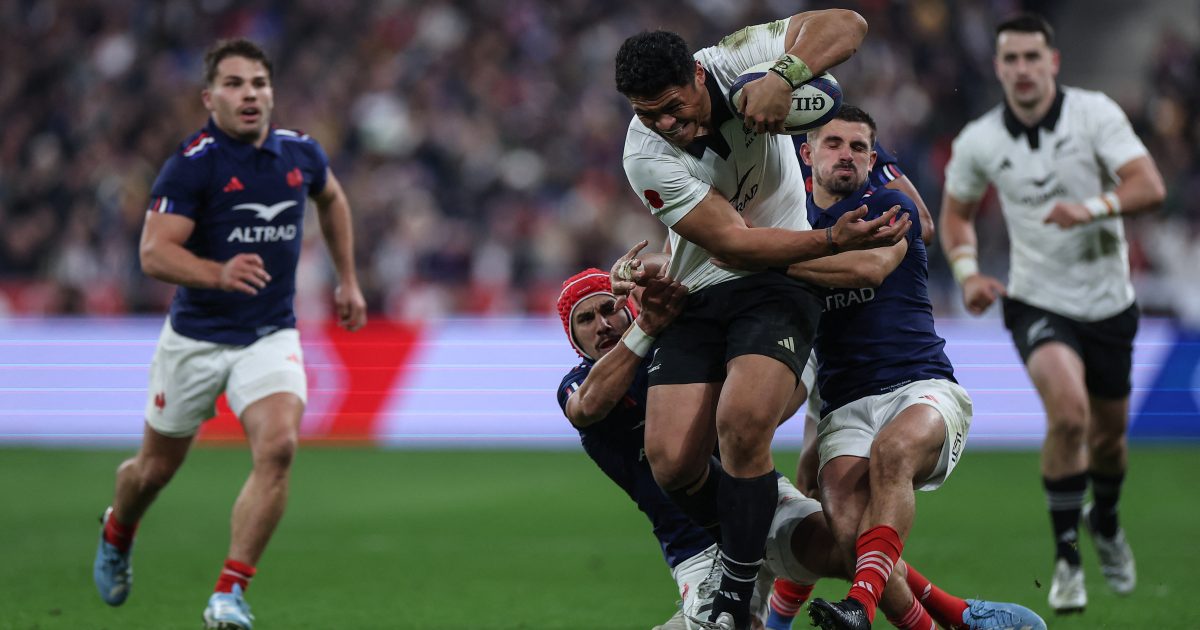Caleb Clarke sur Antoine Dupont : « J’ai beaucoup de respect pour ce mec »

Les All Blacks de Scott Robertson ont perdu d’un point au Stade de France face à une équipe de France soutenue par ses 80 000 spectateurs. Thomas Ramos, le demi d’ouverture français, a été décisif en inscrivant 15 points grâce à ses six tentatives réussies.
Le match a basculé dans les dernières minutes, quand le capitaine des All Blacks, Scott Barrett, a opté pour une pénalité à cinq minutes de la fin, alors que son équipe était à quatre points de retard.
L’Italie est prévenue
« Les garçons se sont regroupés après le coup de sifflet final, car tout le monde a tout donné », a expliqué Caleb Clarke aux médias, peu après la défaite contre la France. « Dans les vestiaires, on le ressentait, tout le monde souffrait, mais une équipe des All Blacks qui souffre reste une équipe dangereuse.
« On attend avec impatience la prochaine opportunité contre l’Italie la semaine prochaine, pour infliger la douleur à nos prochains adversaires. »
Mack Hansen et Jonah Lomu sur la même action 😰
Caleb Clarke a donné le tournis à la défense française au #LA7s, il y a 3 ans 🌪️#HSBC7s pic.twitter.com/DWOiSVcPhS
— RugbyPass FR 🇫🇷 (@RugbyPass_FR) February 21, 2023
La France a inversé la dynamique en début de seconde période grâce à un essai de Louis Bielle-Biarrey, suite à une mauvaise transmission de Tupou Vaa’i.
Les All Blacks ont réussi à prendre trois points à plusieurs reprises, maintenant ainsi une certaine pression sur la France en fin de match.
Des occasions manquées
Clarke reconnaît que les All Blacks ont eu des occasions de remporter la rencontre, mais admet qu’ils n’ont pas su les concrétiser avec efficacité.
« On en a parlé dans les vestiaires. Les tests se jouent sur de petites marges, et à la fin, une seule équipe sort victorieuse. Tout le mérite revient à la France, qui a joué un superbe match et nous a mis sous pression. On a eu nos chances, mais on les a laissées filer », a-t-il reconnu.
Clarke a effectué 14 courses et réalisé deux franchissements, qu’il attribue à la quantité de ballons que ses coéquipiers lui ont envoyés.
« J’étais juste heureux d’avoir le ballon. Je voulais même l’avoir plus souvent, faire avancer le jeu, aller chercher les extérieurs. Surtout en revenant côté fermé, ça a bien fonctionné, mais encore une fois, je pense qu’on a cherché à forcer certaines passes, surtout dans les 22. On a perdu le fil avec des passes forcées ou un déblayage manqué, et ça nous coûte la victoire à la fin. »
Explosion de joie au Stade de France 💙
📺 Live on @rugbyontnt 🤝#FRANZL | #AutumnNationsSeries pic.twitter.com/ZFCSupL1G3
— Autumn Nations Series (@autumnnations) November 16, 2024
Interrogé sur l’équilibre entre passes risquées et récompenses en attaque, Clarke attribue ce travail au staff d’entraîneurs et aux messages transmis aux joueurs.
« Je pense que Razor (Scott Robertson) fait un excellent travail pendant la semaine. Il veut qu’on s’exprime, qu’on joue librement, mais il nous rappelle aussi de ne pas forcer la passe. Il insiste sur le fait de s’assurer qu’on est en contact avant de la lancer ou que le joueur à qui on passe est libre et prêt à recevoir.
« C’est probablement pour ça que cette défaite fait encore plus mal, parce qu’on n’a pas obtenu le résultat, surtout avec un écart d’un seul point. »
Alors, c’est qui le GOAT ?
C’était la première fois que Clarke affrontait le totem et superstar, le demi de mêlée et d’ouverture Antoine Dupont.
« J’ai beaucoup de respect pour ce mec, je crois que c’était la première fois que je le rencontrais. Juste avant, je disais qu’il ne me plaquerait pas, mais je ne l’ai même pas vu arriver. Je me suis demandé d’où il venait ! »
Clarke a donné son avis sur le débat autour du GOAT du rugby et a été interrogé sur la possibilité que Dupont soit le plus grand, même sans jouer à l’extérieur.
L’ailier des All Blacks reste fidèle à son compatriote comme étant le meilleur de tous les temps : « Pour moi, le meilleur joueur reste toujours Richie McCaw, jusqu’à ce que quelqu’un puisse vraiment le surpasser. Oui, on verra comment ça évolue, mais pour l’instant, c’est lui. »
Cet article a été initialement publié sur RugbyPass.com et adapté en français par Willy Billiard.












